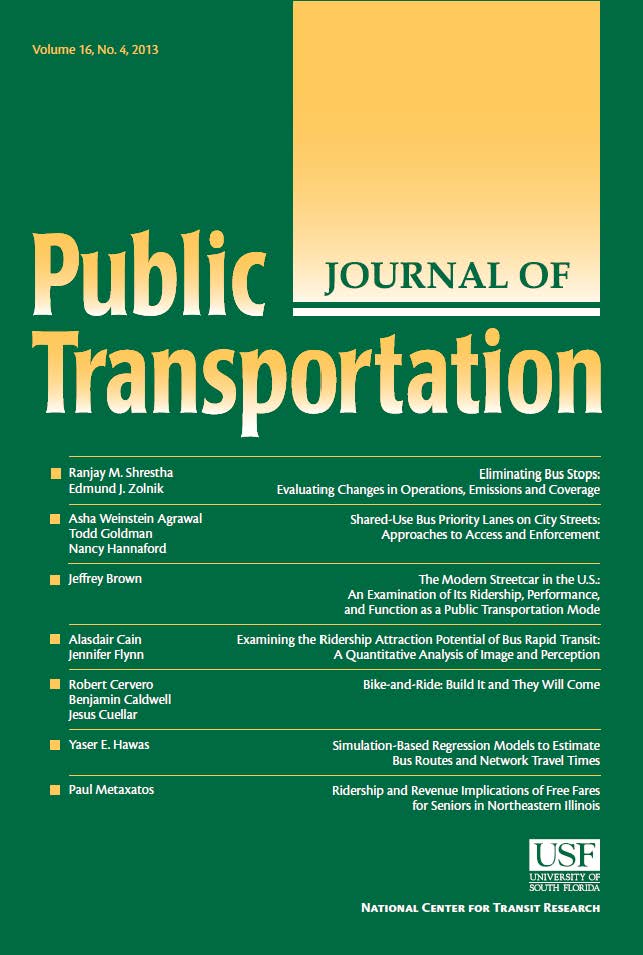An exact approach for the static docked bike rebalancing problem that minimizes the routing costs and unmet demand under various geographic considerations
IF 2
4区 工程技术
Q3 TRANSPORTATION
引用次数: 0
Abstract
Bike sharing systems have the potential to significantly alleviate traffic congestion, reduce emissions and diminish reliance on parking facilities in city centers. One critical factor influencing the success of a bike sharing system is the effectiveness of rebalancing operations. These operations involve repositioning of the bikes at available stations through pickup and delivery activities performed by trucks, so that the anticipated user demand is satisfied. The Static Docked Bike Rebalancing Problem (SBRP) focuses on determining a cost-effective sequence of stations to be visited by trucks, along with the corresponding quantity of bikes to be picked up or delivered at each station. Deviating from past studies, we propose a new formulation for the SBRP problem which minimizes the cost of rebalancing operations, while factoring in the cost of unsatisfied user demand. The developed mathematical model is a mixed-integer nonlinear program, which is reformulated as a mixed-integer linear program. Lazy constraints and valid inequalities are introduced to improve performance and reduce computational times. A new set of problem instances is also generated based on benchmark problem instances from past studies. The applicability of the proposed methodology is also examined on a real case of the bike rebalancing problem, in the municipality of Penteli, a suburban area of Athens, Greece. The experimental findings demonstrate that the proposed model is capable of solving small scale instances to global optimality. Furthermore, the proposed heuristic manages to match the optimal solutions in very short computational times. To analyze the impact of the geographic distribution of station locations on the total cost of transportation of the rebalancing network, different computational experiments have been performed. The results obtained indicate that the stations’ geographic distribution has a significant impact on the total routing costs of the network.
在各种地理条件下,最小化路径成本和未满足需求的静态停靠自行车再平衡问题的精确方法
自行车共享系统有可能显著缓解交通拥堵,减少排放,并减少对市中心停车设施的依赖。影响共享单车系统成功的一个关键因素是重新平衡运营的有效性。这些操作包括通过卡车的拾取和交付活动将自行车重新定位在可用的站点,从而满足预期的用户需求。静态停靠自行车再平衡问题(SBRP)侧重于确定卡车访问站点的成本效益顺序,以及在每个站点取走或交付相应数量的自行车。与以往的研究不同,我们提出了一个新的SBRP问题的公式,该公式在考虑未满足用户需求的成本的同时,将再平衡操作的成本最小化。所建立的数学模型是一个混合整数非线性规划,将其重新表述为一个混合整数线性规划。引入延迟约束和有效不等式来提高性能和减少计算时间。基于过去研究中的基准问题实例,还生成了一组新的问题实例。本文还对希腊雅典郊区Penteli市的自行车再平衡问题的实际案例进行了适用性研究。实验结果表明,该模型能够解决小尺度的全局最优问题。此外,所提出的启发式算法能够在很短的计算时间内匹配最优解。为了分析站点位置的地理分布对再平衡网络总运输成本的影响,进行了不同的计算实验。结果表明,站点的地理分布对网络的总路由成本有显著影响。
本文章由计算机程序翻译,如有差异,请以英文原文为准。
求助全文
约1分钟内获得全文
求助全文
来源期刊

Journal of Public Transportation
TRANSPORTATION-
CiteScore
6.40
自引率
0.00%
发文量
29
审稿时长
26 days
期刊介绍:
The Journal of Public Transportation, affiliated with the Center for Urban Transportation Research, is an international peer-reviewed open access journal focused on various forms of public transportation. It publishes original research from diverse academic disciplines, including engineering, economics, planning, and policy, emphasizing innovative solutions to transportation challenges. Content covers mobility services available to the general public, such as line-based services and shared fleets, offering insights beneficial to passengers, agencies, service providers, and communities.
 求助内容:
求助内容: 应助结果提醒方式:
应助结果提醒方式:


